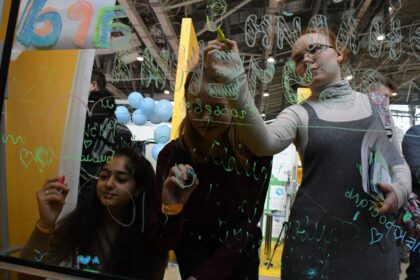“Учиться надо так, чтобы получать удовольствие” – эти слова стали моим важным педагогическим принципом обучения английскому языку в школе, а для детей – их основным девизом учения. Реализовать на практике этот принцип помогают разнообразные игры и игровые приемы, которые являются наиболее эффективным средством развития творческой активности учеников.
Важная роль на начальном этапе обучения английскому языку принадлежит играм. Предлагаемая система игровых приемов может быть использована с целью:
– тренировки языковых знаний учеников;
– как мотивирующие задания в начале урока и служить “мостиком” к изучаемому материалу основной части урока;
– как релаксация в середине урока, “Let▓s play”.
Система игровых приемов включает игры на угадывание, на развитие памяти, внимания, воображения, а также командные, соревновательные и игры на движение.
Learning and Getting Fun of the Lesson
Any activity should be stimulating, meaningful, enjoyable and successful otherwise it has no sense. Learning is not only duty and compulsion for a learner. It sould be surprising, problem solving and pleasant. I do my best to set up such activities at my regular lessons and try to create a friendly atmosphere, healthy relationship with mutual trust and respect, with concern and care for every learner. Planning my lessons I think of 3-Ss (Surprise, Satisfaction, Success). How to make students get surprised, feel satisfied, happy and successful. Very important is the beginning of the lesson. I▓m sure a good beginning is half the ending. As the proverb says: “Well begun is welldone”. So beginning my lessons I try to win pupils▓ regard and favour, inspiring them for work. A good help in this case are “warming-up” and “ice-breaker” activities. Any game should be purposeful, practical and well-connected with the title of the lesson and not just for the sake of playing.
Warming-up games.
1. Guessing games.
a) “A black box”. Can you guess what there▓s in the box? (there are 3-4 school things, some toys, a balloon, a sweet etc.). General questions are incouraged : Is it a toy? Is it a school thing? Is it eatable? etc. Variation : I have a bag. What is there in my bag today? (there▓s only one thing in a bag).
b) Can you guess an English name of a picture or a toy doll ? The one who guesses, -gets a reward.
c) “You see but can▓t hear”. Practising verbs of action or adjectives. Non-verbal communication. The class should guess the meaning of the words that one of the pupils tries to explain with the help of guestures and mime.
d) Practising numerals.
Can you guess the number of pages in this book? The one who manages to do it gets the book as a present.
e) Can you guess the weight of this parcel? (an orange, an apple or a small toy is wrapped up). The one who is more precise is presented with the parcel.
f) “When is your birthday?”
The pupils are asked to do the following calculations on a sheet of paper.
l) Multiply the day of your birth by two.
2) The result x 10.
3) Add 73.
4) The sum x 5.
5) Add the month of your birthday :
Example : the student was born, say, on the 17th of August (17.08). His/her calculations are : 17 x 2 = 34 ; 34 x 10 = 340 ; 340 + 73 = 413 ; 413 x 5 = 2065; 2065 + 8 = 2073. This number is told to the teacher. Teacher▓s calculations are : 2073 – 365 = 1708. So the pupil▓s birthday is 17.08. That is really a great surprise for the pupils. You have to write only 3 words on the blackboard. Add (+); Multiply (x); Substract (-).
g) “I can guess your favourite food”. Description of the game. 2 or 3 pupils leave the classroom for a while.(They shouldn▓t know the secret of the game). They are asked to write on a piece of paper their favourite food. The rule of the game : the players should repeat the word “No” as many times as a teacher calls out different items of food. And when they hear the word, named after “lemon”, they happily say “Yes” (that is the very word they had to guess). Pupils usually fail to guess the secret of the game. Variations : you can guess pupils▓ favourite colour, month,animal,etc.
2. Attention games, requiring concentration. Be attentive!
a) Repeat the word in unision if it is eatable, if not say nothing.
b) Clap your hands if you hear a noun in the plural or (a verb in the second/third form).
c) Single out the word which doesn▓t fit here, doesn▓t belong to a group of three words (apple, bear, pear). The words are pronounced, the pupils hear the words but don▓t see them.
d) The students are not allowed to answer the questions using “Yes, No, OK”. “Are you ready for the lesson”? Is it Monday today? Have you got a sister? Do you like English? Are you fond of sports?” Questions should be unexpected and alternating general and special ones. Possible answers: certainly, why not?, I think it is and so on.
3. Team games. “Nonsense. That▓s OK”. Matching game. Class is divided into 2 teams. Each player of one team is given a white card with a noun on it, for example (cinema, cake, bed, dinner, homework) the other team players are given red cards with verbs (have, do, make, go to, like) one for each player. The thing is whether the words match. If they do, the pupils say “That▓s OK”, if not, they say “Nonsense”. Instead of verbs adjectives can be used. Different variations of a matching game are possible. They are most lovely and fun.
4. Contest games. In-pair games.
a) “Duel”. Exchange of shots.
Who will name the last word on the topic, say “food”.
b) “Boaster competition”.
I can swim better than you do.; I▓m stronger than you are.; My hair is more beautiful than yours.
5. Movement games.
a) Numbers, words (weekdays, months, seasons, school subjects). Find the right place in the alphabet, caledar, etc.
b) “Hot. Warm. Cold.” (practising prepositions of place). Looking for a hidden object in the classroom.
c) Who is the first to reach the blackboard coming from the back row ? One step, one word on a given topic.
6. Memory games.
1. “Snowball”. What do you want to do? (training Present Simple Tense).
I want to eat. What about you? The next student repeats the verb “to eat” and adds his\her own one. Be attentive not to miss a verb. Don▓t break the chain of words.
2. Who can name the greatest number of animals? (сlothes, kitchen items and so on).
3. Who can name the largest number of words beginning with the letter “c” for example.
4. Can you count from back to forward 10,9 …? Can you name the letters from Z to A?
5. Word-chain game to train lopic words (like “snowball”).
6. “I know 5 names of flowers, trees, birds,…. . Can you name the sixth one? The task is to repeat the five words and add one more.
7. Insisting games.
1. Yes, I do. No, I don▓t (training Present Simple Tense). Do you like watching TV? (playing dendy, listening to music, summer, ice-cream etc.? The pupils repeat : “Yes, I do”.
Do you like to do homework? (to get up early, to wash the floor, to be on duty…?) Pupils are encouraged to answer “No, I don▓t”. Questions may be illustrated with pictures.
2. “I want but I can▓t. I must…”
I must tidy up the rooms, go shopping, feed the animals, wash, cook, etc. Would you like to go to the cinema (disco,..)? – I▓d like but I can▓t. I must … (training modal verbs and “helping about the house” topic).
8. Imagination games.
1. ” Suppose you have something” (Word association).
The rule: one pupil names a toy, the other should name a toy too. Say, one names a food the other says a food too.
I have a ball. I have a doll.
I have a sister. I have a brother.
2. I am a flower. What are you? 1 am a tree (river, sun, morning …)
3. Answer the questions using the words beginning with the letter, say, “B”. What▓s your name? (Bessy.) What is your surname? (Baker). What▓s your favourite colour? (black). What do you usually have for breakfast? (bread and butter). What have you bought? (boots). What animals have you seen in the zoo? (bears). Where are you going? (to the beach).







 Выбор читателей
Выбор читателей







Комментарии